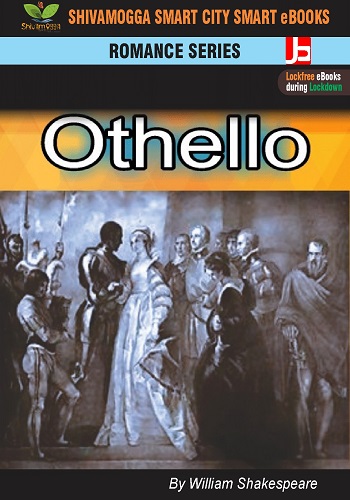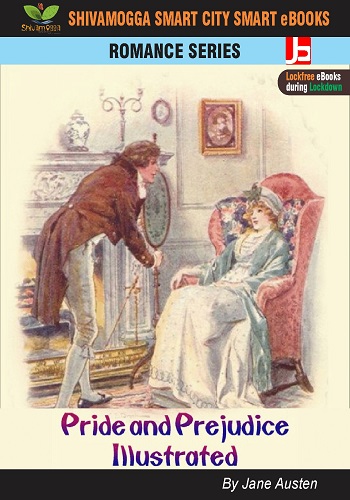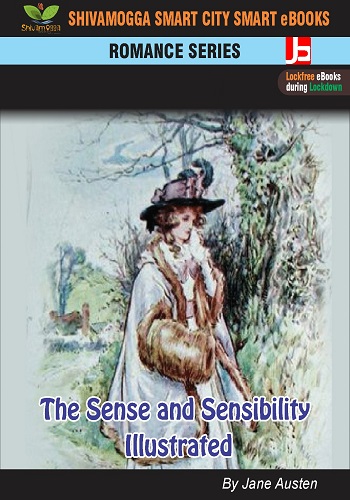-
 Othello (The Romance of Othello, the Moor of Venice) is a tragedy by William Shakespeare. It is based on the story Un Capitano Moro ("A Moorish Captain") by Cinthio (a disciple of Boccaccio's). The story revolves around its two central characters: Othello, a Moorish general in the Venetian army, and his treacherous ensign, Iago. Given its varied and enduring themes of racism, love, jealousy, betrayal, revenge, and repentance.
Othello (The Romance of Othello, the Moor of Venice) is a tragedy by William Shakespeare. It is based on the story Un Capitano Moro ("A Moorish Captain") by Cinthio (a disciple of Boccaccio's). The story revolves around its two central characters: Othello, a Moorish general in the Venetian army, and his treacherous ensign, Iago. Given its varied and enduring themes of racism, love, jealousy, betrayal, revenge, and repentance. -
 "It is a truth universally acknowledged, that a single man in possession of a good fortune, must be in want of a wife." And certainly what Melville did for whaling Austen does for marriage--tracing the intricacies (not to mention the economics) of 19th-century British rituals with a sure hand and an unblinking eye. As usual, Austen trains her sights on a country village and a few families--in this case, the Bennets, the Philips, and the Lucases. Into their midst comes Mr. Bingley, a single man of good fortune, and his friend, Mr. Darcy, who is even richer. Mrs. Bennet, who married above her station, sees their arrival as an opportunity to marry off at least one of her five daughters. Bingley is complaisant and easily charmed by the eldest Bennet girl, Jane; Darcy, however, is harder to please. Put off by Mrs. Bennet's vulgarity and the untoward behavior of the three younger daughters, he is unable to see the true worth of the older girls, Jane and Elizabeth. His excessive pride offends Lizzy, who is more than willing to believe the worst that other people have to say of him; when George Wickham, a soldier stationed in the village, does indeed have a discreditable tale to tell, his words fall on fertile ground. Having set up the central misunderstanding of the novel, Austen then brings in her cast of fascinating secondary characters: Mr. Collins, the sycophantic clergyman who aspires to Lizzy's hand but settles for her best friend, Charlotte, instead; Lady Catherine de Bourgh, Mr. Darcy's insufferably snobbish aunt; and the Gardiners, Jane and Elizabeth's low-born but noble-hearted aunt and uncle. Some of Austen's best comedy comes from mixing and matching these representatives of different classes and economic strata, demonstrating the hypocrisy at the heart of so many social interactions. And though the novel is rife with romantic misunderstandings, rejected proposals, disastrous elopements, and a requisite happy ending for those who deserve one, Austen never gets so carried away with the romance that she loses sight of the hard economic realities of 19th-century matrimonial maneuvering. Good marriages for penniless girls such as the Bennets are hard to come by, and even Lizzy, who comes to sincerely value Mr. Darcy, remarks when asked when she first began to love him: "It has been coming on so gradually, that I hardly know when it began. But I believe I must date it from my first seeing his beautiful grounds at Pemberley." She may be joking, but there's more than a little truth to her sentiment, as well. Jane Austen considered Elizabeth Bennet "as delightful a creature as ever appeared in print". Readers of Pride and Prejudice would be hard-pressed to disagree. --Alix Wilber
"It is a truth universally acknowledged, that a single man in possession of a good fortune, must be in want of a wife." And certainly what Melville did for whaling Austen does for marriage--tracing the intricacies (not to mention the economics) of 19th-century British rituals with a sure hand and an unblinking eye. As usual, Austen trains her sights on a country village and a few families--in this case, the Bennets, the Philips, and the Lucases. Into their midst comes Mr. Bingley, a single man of good fortune, and his friend, Mr. Darcy, who is even richer. Mrs. Bennet, who married above her station, sees their arrival as an opportunity to marry off at least one of her five daughters. Bingley is complaisant and easily charmed by the eldest Bennet girl, Jane; Darcy, however, is harder to please. Put off by Mrs. Bennet's vulgarity and the untoward behavior of the three younger daughters, he is unable to see the true worth of the older girls, Jane and Elizabeth. His excessive pride offends Lizzy, who is more than willing to believe the worst that other people have to say of him; when George Wickham, a soldier stationed in the village, does indeed have a discreditable tale to tell, his words fall on fertile ground. Having set up the central misunderstanding of the novel, Austen then brings in her cast of fascinating secondary characters: Mr. Collins, the sycophantic clergyman who aspires to Lizzy's hand but settles for her best friend, Charlotte, instead; Lady Catherine de Bourgh, Mr. Darcy's insufferably snobbish aunt; and the Gardiners, Jane and Elizabeth's low-born but noble-hearted aunt and uncle. Some of Austen's best comedy comes from mixing and matching these representatives of different classes and economic strata, demonstrating the hypocrisy at the heart of so many social interactions. And though the novel is rife with romantic misunderstandings, rejected proposals, disastrous elopements, and a requisite happy ending for those who deserve one, Austen never gets so carried away with the romance that she loses sight of the hard economic realities of 19th-century matrimonial maneuvering. Good marriages for penniless girls such as the Bennets are hard to come by, and even Lizzy, who comes to sincerely value Mr. Darcy, remarks when asked when she first began to love him: "It has been coming on so gradually, that I hardly know when it began. But I believe I must date it from my first seeing his beautiful grounds at Pemberley." She may be joking, but there's more than a little truth to her sentiment, as well. Jane Austen considered Elizabeth Bennet "as delightful a creature as ever appeared in print". Readers of Pride and Prejudice would be hard-pressed to disagree. --Alix Wilber -
 Jane Austen’s first published novel, Sense and Sensibility is a wonderfully entertaining tale of flirtation and folly that revolves around two starkly different sisters, Elinor and Marianne Dashwood. While Elinor is thoughtful, considerate, and calm, her younger sister is emotional and wildly romantic. Both are looking for a husband, but neither Elinor’s reason nor Marianne’s passion can lead them to perfect happiness—as Marianne falls for an unscrupulous rascal and Elinor becomes attached to a man who’s already engaged. Startling secrets, unexpected twists, and heartless betrayals interrupt the marriage games that follow. Filled with satiric wit and subtle characterizations, Sense and Sensibility teaches that true love requires a balance of reason and emotion.
Jane Austen’s first published novel, Sense and Sensibility is a wonderfully entertaining tale of flirtation and folly that revolves around two starkly different sisters, Elinor and Marianne Dashwood. While Elinor is thoughtful, considerate, and calm, her younger sister is emotional and wildly romantic. Both are looking for a husband, but neither Elinor’s reason nor Marianne’s passion can lead them to perfect happiness—as Marianne falls for an unscrupulous rascal and Elinor becomes attached to a man who’s already engaged. Startling secrets, unexpected twists, and heartless betrayals interrupt the marriage games that follow. Filled with satiric wit and subtle characterizations, Sense and Sensibility teaches that true love requires a balance of reason and emotion. -
 The Tempest has Romantics elements of both tragedy and comedy. The Tempest is one of two of Shakespeare’s works that is set on an island. The action takes place over the course of one day. Prospero, the rightful Duke of Milan, has been exiled to the island by his brother Antonio who had usurped his title twelve years before. Antonio was able to achieve this with the help of Alonso, the King of Naples. Prospero lives on the island with his fifteen year old daughter Miranda.
The Tempest has Romantics elements of both tragedy and comedy. The Tempest is one of two of Shakespeare’s works that is set on an island. The action takes place over the course of one day. Prospero, the rightful Duke of Milan, has been exiled to the island by his brother Antonio who had usurped his title twelve years before. Antonio was able to achieve this with the help of Alonso, the King of Naples. Prospero lives on the island with his fifteen year old daughter Miranda. -
 The mystery by E. Phillips Oppenheim starts out in the Sierra Nevada mountains, 500 miles from San Francisco, at a gold mining camp. Bryan came to America from England, chasing a man who may have papers which explain Bryan's mysterious origins. Enter heroine, the beautiful orphan Myra Mercier who is arriving to the camp where women are not allowed. Murder and mayhem ensue before the pair escapes to San Francisco. Bryan abandons Myra and travels back to England alone, where he takes up residence in the country, near the home of Lady Helen, the ward of Lord Wessemer. Bryan seeks to improve himself, and his status, in order to win the hand of the beautiful, but cold, Lady Helen. Finally, Myra makes her way to England as a actress, and Bryan decide who to wed.
The mystery by E. Phillips Oppenheim starts out in the Sierra Nevada mountains, 500 miles from San Francisco, at a gold mining camp. Bryan came to America from England, chasing a man who may have papers which explain Bryan's mysterious origins. Enter heroine, the beautiful orphan Myra Mercier who is arriving to the camp where women are not allowed. Murder and mayhem ensue before the pair escapes to San Francisco. Bryan abandons Myra and travels back to England alone, where he takes up residence in the country, near the home of Lady Helen, the ward of Lord Wessemer. Bryan seeks to improve himself, and his status, in order to win the hand of the beautiful, but cold, Lady Helen. Finally, Myra makes her way to England as a actress, and Bryan decide who to wed. -
 While the word “gentlemen” suggests that its heroes are adults, The Two Gentlemen of Verona is more intelligible if we think of them as boys, leaving home for the first time. One has a crush on a girl, Julia, though he hasn’t yet told her. Sent to court to learn to be “perfect gentlemen,” Valentine and Proteus are derailed by their attraction to Sylvia, the ruler’s daughter. Valentine’s mental denseness does not deter Sylvia from returning his love, but he is caught, and banished, when he tries to elope with her. Proteus’s desire for Sylvia wipes out his former love, leading him into despicable acts that win scorn from Sylvia and wound Julia, who has pursued him disguised as a boy. When Sylvia follows Valentine into banishment, Proteus follows Sylvia, and Julia follows Proteus, the stage is set for a disturbing ending. But the stage is also set for the “gentlemen” to take small steps toward maturity.
While the word “gentlemen” suggests that its heroes are adults, The Two Gentlemen of Verona is more intelligible if we think of them as boys, leaving home for the first time. One has a crush on a girl, Julia, though he hasn’t yet told her. Sent to court to learn to be “perfect gentlemen,” Valentine and Proteus are derailed by their attraction to Sylvia, the ruler’s daughter. Valentine’s mental denseness does not deter Sylvia from returning his love, but he is caught, and banished, when he tries to elope with her. Proteus’s desire for Sylvia wipes out his former love, leading him into despicable acts that win scorn from Sylvia and wound Julia, who has pursued him disguised as a boy. When Sylvia follows Valentine into banishment, Proteus follows Sylvia, and Julia follows Proteus, the stage is set for a disturbing ending. But the stage is also set for the “gentlemen” to take small steps toward maturity.

